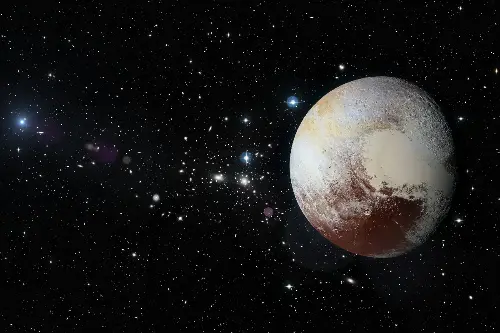At the far reaches of our solar system lies Pluto, a mysterious and chilly sphere that has captivated astronomers and the public alike for more than a century. Discovered in 1930 by astronomer Clyde Tombaugh, Pluto was long considered the ninth and most distant planet in our solar system. For 76 years, it held its place in our collective imagination as the final frontier of planetary exploration.

The Great Planetary Debate
Pluto's planetary status was uncontested until the late 20th century, when discoveries of other similar-sized bodies in the outer solar system began to raise questions about what constitutes a planet. The debate came to a head in August 2006 when the International Astronomical Union (IAU) redefined the term "planet," leading to Pluto's reclassification as a dwarf planet.
The IAU Criteria for Planethood
The IAU's definition stipulated three key criteria for a celestial body to be classified as a planet. First, it must orbit the Sun. Second, it must be spherical in shape due to its own gravitational force. Third, and most contentiously, it must have cleared the neighbourhood around its orbit.
Pluto meets the first two criteria: it orbits the Sun and is rounded by its own gravity. However, it fails the third criterion. Pluto shares its orbital region with objects in the Kuiper Belt, a vast collection of ice and rock debris that extends beyond the orbit of Neptune.
Pluto and the Kuiper Belt
The Kuiper Belt is home to many objects similar to and even larger than Pluto, such as Eris, which was discovered in 2005. This precipitated a closer look at what qualifies a body to be a planet since these additional objects would have potentially expanded the number of planets in our solar system significantly if they were all to be included.
As a result of these finds, astronomers agreed on the need for a clear distinction between planets and the smaller bodies of the solar system. The concept of the dwarf planet was introduced, which encompasses Pluto as well as Eris and other large objects that share their orbits with other debris.
Dwarf Planet, Not a Lesser Planet
The term "dwarf planet" may suggest a lesser categorisation, but that's not the intention within the astronomical community. Dwarf planets are celestial bodies that are indeed planets in the sense that they are spherical and orbit the Sun, just not dominant enough in their orbit to qualify under the IAU's definition of a planet.
Pluto's Unique Characteristics and Contributions to Science
Despite the reclassification, Pluto remains a fascinating object of study. The New Horizons mission, which flew by Pluto in July 2015, revealed a world of unexpected complexity and beauty, with mountains of ice and a heart-shaped plain filled with frozen nitrogen.
These findings have not only enriched our understanding of Pluto but also provided valuable insights into the history and makeup of the solar system's outer regions.
The Emotional Impact of Pluto's Redefinition
For many, Pluto's reclassification was a moment of mixed emotions. Some lamented the perceived "demotion," while others embraced the evolving nature of science and our understanding of the cosmos. As of now, children's astronomy books have been updated, and mnemonics for memorising the planets have sadly lost their final 'P'.
Looking to the Future
The enhancement of our knowledge about Pluto and the Kuiper Belt marks a fascinating development in astronomy, showing us that science is never static. Classifications and concepts can change with new discoveries, and Pluto's story is a testament to the evolving pursuit of knowledge in the cosmic realm.
Pluto's shift to a dwarf planet status reminds us that as we learn more, we must be willing to adapt our frameworks and understanding. The exploration of the outer solar system continues, and Pluto remains an object of significant interest and affection, regardless of its classification.
In the vastness of space, our definitions and categories may seem small, but they reflect our ongoing quest to make sense of the universe. Whether as the once-ninth planet or a beloved dwarf planet, Pluto continues to intrigue and educate us, a distant beacon on the frontier of space exploration and human curiosity.
